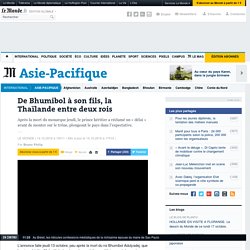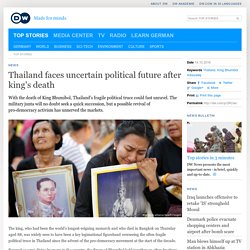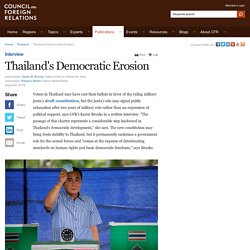

De Bhumibol à son fils, la Thaïlande entre deux rois. Après la mort du monarque jeudi, le prince héritier a réclamé un « délai » avant de monter sur le trône, plongeant le pays dans l’expectative.

LE MONDE | • Mis à jour le | Par Bruno Philip L’annonce faite jeudi 13 octobre, peu après la mort du roi Bhumibol Adulyadej, que le prince héritier Maha Vajiralongkorn demandait un « délai » avant de monter sur le trône, résonne peut-être déjà comme un symbole de l’avenir possiblement incertain de la Thaïlande, au lendemain de la disparition d’un souverain qui aura marqué soixante-dix ans de l’histoire de son pays. Une telle temporisation surprend : Bhumibol, décédé à 88 ans, avait immédiatement succédé à son frère, le roi Ananda Mahidol, tué au palais en 1946 d’un coup de revolver dans des circonstances obscures.
Lire la nécrologie : Le roi Bhumibol s’est éteint après soixante-dix ans de règne Les anciennes générations tenaient Bhumibol dans une estime débridée, permise par un culte constant de sa personnalité. Bangkok transfigurée par le deuil. Thailand faces uncertain political future after king′s death. The king, who had been the world's longest-reigning monarch and who died in Bangkok on Thursday aged 88, was widely seen to have been a key legimational figurehead overseeing the often fragile political truce in Thailand since the advent of the pro-democracy movement at the start of the decade.

Revered as semi-divine by many in the country, the figure of Bhumibol held together an often fractious coalition of Bangkok business elites, a new middle class and its Thai Democrat party, and the royalist military to prevent the return of exiled former Prime Minister Thaksin Shinawatra or the electoral dominance of his party. Experts on the Thai royal family note that the country's strict lese-majeste laws muffle detailed discussion of the sensitive succession issue. "We maybe shouldn't read too much into (the delay)," David Streckfuss, an expert on the Thai monarchy, told the AFP news agency.
"But we have already departed from what should have been a normal succession process. What the Death of Thailand’s King Means, and What’s Next. Karen Brooks: Thailand's Democratic Erosion. Interviewee: Karen B.

Brooks, Adjunct Senior Fellow for AsiaInterviewer: Eleanor Albert, Online Writer/Editor August 8, 2016 Voters in Thailand may have cast their ballots in favor of the ruling military junta's draft constitution, but the junta's win may signal public exhaustion after two years of military rule rather than an expression of political support, says CFR's Karen Brooks in a written interview. "The passage of this charter represents a considerable step backward in Thailand's democratic development," she says.
The new constitution may bring fresh stability to Thailand, but it permanently enshrines a government role for the armed forces and "comes at the expense of deteriorating standards on human rights and basic democratic freedoms," says Brooks. Thai Prime Minister Prayuth Chan-ocha casts his ballot during a constitutional referendum vote in Bangkok, Thailand August 7, 2016. What do the results of the Thai referendum reveal about the country's political climate?